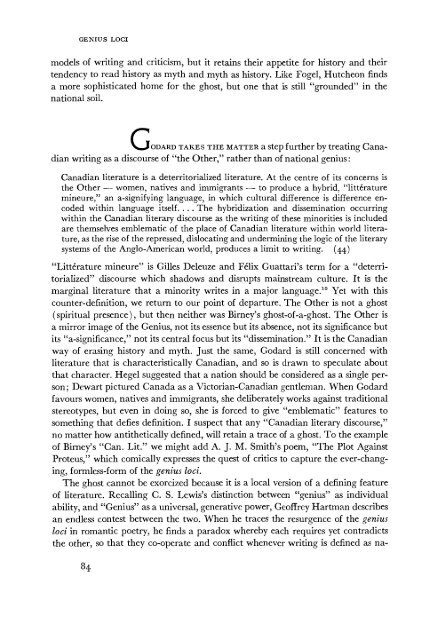GENIUS LOCI
GENIUS LOCI
GENIUS LOCI
Create successful ePaper yourself
Turn your PDF publications into a flip-book with our unique Google optimized e-Paper software.
<strong>GENIUS</strong> <strong>LOCI</strong><br />
models of writing and criticism, but it retains their appetite for history and their<br />
tendency to read history as myth and myth as history. Like Fogel, Hutcheon finds<br />
a more sophisticated home for the ghost, but one that is still "grounded" in the<br />
national soil.<br />
GIODARD TAKES THE MATTER a step further by treating Canadian<br />
writing as a discourse of "the Other," rather than of national genius:<br />
Canadian literature is a deterritorialized literature. At the centre of its concerns is<br />
the Other — women, natives and immigrants — to produce a hybrid, "littérature<br />
mineure," an a-signifying language, in which cultural difference is difference encoded<br />
within language itself. . . . The hybridization and dissemination occurring<br />
within the Canadian literary discourse as the writing of these minorities is included<br />
are themselves emblematic of the place of Canadian literature within world literature,<br />
as the rise of the repressed, dislocating and undermining the logic of the literary<br />
systems of the Anglo-American world, produces a limit to writing. (44)<br />
"Littérature mineure" is Gilles Deleuze and Félix Guattari's term for a "deterritorialized"<br />
discourse which shadows and disrupts mainstream culture. It is the<br />
marginal literature that a minority writes in a major language. 10 Yet with this<br />
counter-definition, we return to our point of departure. The Other is not a ghost<br />
(spiritual presence), but then neither was Birney's ghost-of-a-ghost. The Other is<br />
a mirror image of the Genius, not its essence but its absence, not its significance but<br />
its "a-significance," not its central focus but its "dissemination." It is the Canadian<br />
way of erasing history and myth. Just the same, Godard is still concerned with<br />
literature that is characteristically Canadian, and so is drawn to speculate about<br />
that character. Hegel suggested that a nation should be considered as a single person<br />
; Dewart pictured Canada as a Victorian-Canadian gentleman. When Godard<br />
favours women, natives and immigrants, she deliberately works against traditional<br />
stereotypes, but even in doing so, she is forced to give "emblematic" features to<br />
something that defies definition. I suspect that any "Canadian literary discourse,"<br />
no matter how antithetically defined, will retain a trace of a ghost. To the example<br />
of Birney's "Can. Lit." we might add A. J. M. Smith's poem, "The Plot Against<br />
Proteus," which comically expresses the quest of critics to capture the ever-changing,<br />
formless-form of the genius loci.<br />
The ghost cannot be exorcized because it is a local version of a defining feature<br />
of literature. Recalling C. S. Lewis's distinction between "genius" as individual<br />
ability, and "Genius" as a universal, generative power, Geoffrey Hartman describes<br />
an endless contest between the two. When he traces the resurgence of the genius<br />
loci in romantic poetry, he finds a paradox whereby each requires yet contradicts<br />
the other, so that they co-operate and conflict whenever writing is defined as na-<br />
84

















